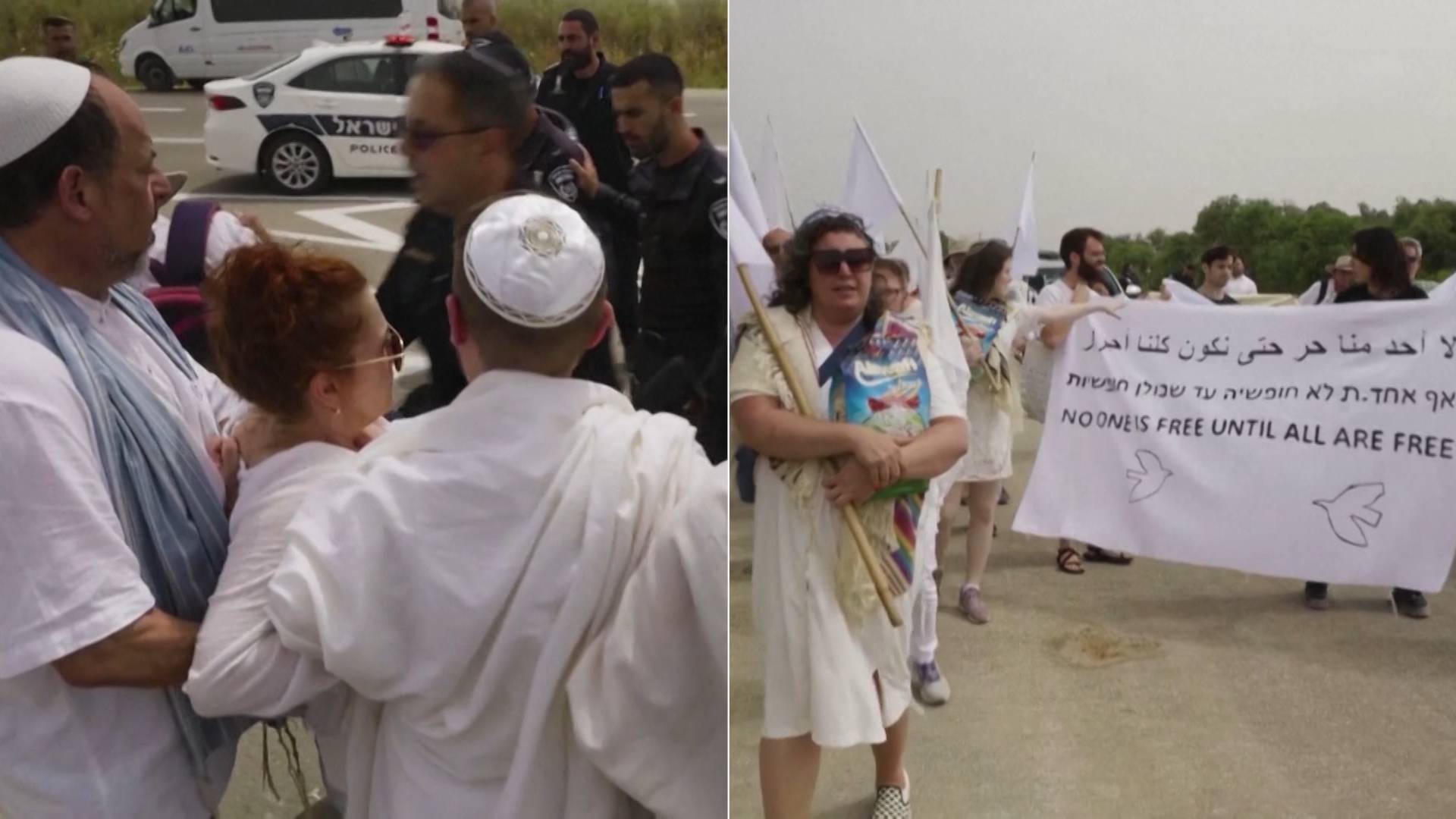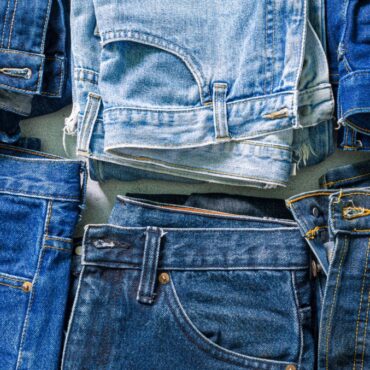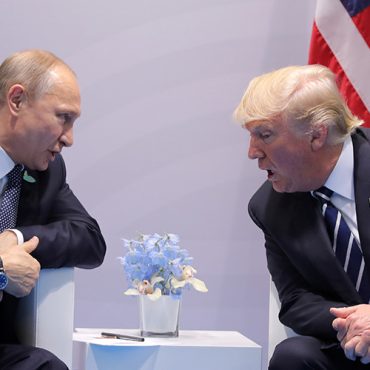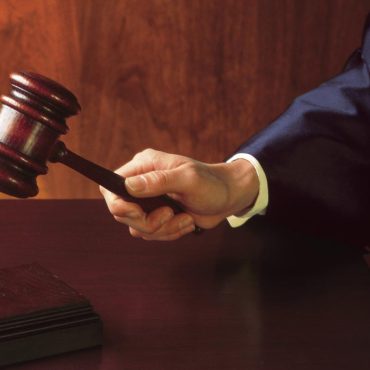This is a rush transcript. Copy may not be in its final form.
AMY GOODMAN: This is Democracy Now!, democracynow.org, The War and Peace Report. I’m Amy Goodman.
Israeli police arrested seven rabbis and Israeli activists Friday at the Gaza border during an action that accused Israel of using starvation as a weapon of war against Palestinians. The delegation of Rabbis for Ceasefire carried bags of food to the Erez crossing between Israel and northern Gaza amidst reports that famine is imminent for more than a million Palestinians in Gaza. Among those who were joining the protest was Rabbi Avi Dabush, who is a survivor of the October 7th Hamas attack on Kibbutz Nirim.
RABBI AVI DABUSH: I’m really proud of it, you know, being here in the name of Jewish values, being here in the name of Jewish discourse in the Torah and talking about human rights for all people here. Of course, I can’t forget the Israelis. I was in Kibbutz Nirim on October 7th and can’t forget the hostages. But, then again, I can’t forget also our people, you know, human beings in Gaza, that are starving, got killed by thousands and have devastating wounds.
AMY GOODMAN: For more, we’re joined by Rabbi Alissa Wise. She’s now in Philadelphia after her release and return to the United States, founder and organizer with Rabbis for Ceasefire, former co-executive director of Jewish Voice for Peace, where she was also the founding co-chair of JVP’s Rabbinical Council. She’s now back in Philadelphia. And joining us from Tel Aviv is Ayelet Waldman, the Israeli American novelist and writer, who was arrested alongside Rabbi Wise and six others. Her husband, Michael Chabon, is also the noted novelist, the Pulitzer Prize winner, who expressed deep concern about Ayelet’s status on Instagram, writing, “She was there in the company of a group of American rabbis, #rabbis4ceasefire, to show the world, the people of Gaza, and their fellow Jews in Israel and around the world that Judaism teaches: justice, lovingkindness, peace, mercy, liberation,” Chabon wrote.
We welcome you both to Democracy Now! Why don’t we start with Ayelet Waldman, the noted Israeli American author, novelist, in Tel Aviv right now? Ayelet, why did you go to the Erez crossing? Explain what it is. And what happened?
AYELET WALDMAN: The Erez crossing is the crossing in — before the latest calamity, where you could cross in and out of Gaza, of course, very restricted. Now it is something else entirely. We approached — I want to be very clear: We approached the Erez crossing as close as we could get, but obviously it’s blocked off.
Why I went? I think it is incredibly important that those of us who have privilege use that privilege to call attention to this ongoing catastrophe. So, I want to be very clear. My husband was worried about me. It’s sweet. I had an uncomfortable nine-and-a-half hours. I had a mildly unpleasant nine-and-a-half hours. When a Palestinian here is arrested and goes into one of the many military prisons, their experience is horrible. They can be held without charges. There are children who are held without charges. When an Israeli Jewish activist — they have been arrested over and over again. They put their bodies on the line. They put their reputations on the line in terms of their community. What we experienced was very minor. But I think — I can only speak for myself, to say that it felt critical to me to use whatever small platform I have to draw attention to this crisis and to say that as a human being, and as a human being born in this country, I have to use my voice to say that this kind of horrific violence, this starving of children, this mass bombing, is completely unacceptable. It is not just unjust. It’s horrific.
And I also — I don’t deny that what happened on October 7th was an atrocity. It broke my heart. I don’t deny that what’s being experienced by the Israeli hostages now in Gaza is horrible, truly horrible. And my heart breaks for the families of the hostages. But we are seeing right now the mass starvation of an entire people. We are seeing an area where millions lived being reduced to dust. And people of good conscience simply cannot stand by and ignore or, you know, cluck our teeth and say, you know, “It’s really a shame, but Hamas, they’re so terrible.” Yeah, they’re terrible. But it doesn’t matter. And right now what matters is stopping the starvation and the murder of millions of people in Gaza.
AMY GOODMAN: I want to bring Rabbi Alissa Wise into this conversation. You’ve just left the Erez border crossing, and you’re now in Philadelphia. You’re founder of Rabbis for Ceasefire. Talk about why you went there. Israel has said they were opening that border to get aid in.
RABBI ALISSA WISE: Yeah. So, we came during the holiday of Passover, which is actually ending today and tomorrow. Passover is known as Z’man Cheiruteinu, the season of our freedom. And if that is going to be anything, it must mean that we work for the freedom of all people. It doesn’t work that one people is free and another is captive. And Israel has — as your other guests have highlighted, is enacting a siege on the people of Gaza where now people are on the verge of death through a policy of forced starvation, that is in the wake of decades of an Israeli policy of forced displacement, occupation, apartheid and Nakba, Catastrophe, that began in 1948.
So, for us, as rabbis, when we came to think about what are we going to do this Pesach, this Passover, when we know that so many Jews are struggling with what does it mean to sit around a table and celebrate freedom when in our names a forced starvation and a mass murder is taking place, and it felt critical to us that we do literally whatever we possibly could to support the people of Gaza. So we came to the Erez crossing. And as we marched towards it, we chanted the words that begin the Magid section of the Passover Seder, which is the time in the Passover Seder where we tell the story of our people’s liberation. And it begins with, ”Kol dichfin yeitei v’yeichol,” “Let all who are hungry come and eat.”
And what does our tradition mean if not our ability and, actually, our mandate to speak out against Israel, a state that is speaking in our name? And I think it’s doubly important because it kind of betrays the lie that Israel is a Jewish state. Israel is a state that is acting in its own interests, that has actually nothing to do with Jewish tradition or Jewish values. Jewish values teach that all people are made b’tselem elohim, in the image of the divine. And this is not how you treat the divine.
AMY GOODMAN: Can you explain why you were arrested on Friday at the Erez border crossing?
RABBI ALISSA WISE: So, when we got to the crossing, you know, we anticipated that we would be stopped, but it felt urgent that we try. So, we were at the border, and the police were insistent on pushing us back. You know, they actually did physically push us. And, you know, to us American activists, it felt really intense and violent. And later, some of the veteran Israeli activists that were with us were like, “Oh, they were actually being really light with you.” And we were like, “Wow, I can’t imagine what it looks like” — I mean, I can imagine what it looks like, you know, for them to be even more violent.
So, you know, they were insisting that we were in a closed military zone, which is — you know, we were freely walking down the road, so it wasn’t — there was nothing visible at where we were that we were in a closed military zone, though I know from other years of activism in the West Bank that that’s often what they say, is, “This is a closed military zone, and you can’t enter.” And so, they began arresting us and then forcibly removing everyone else who had come. So, we had parked our cars down the road and attempted to go on foot, and they pushed everybody back to their cars.
So, you know, then we were taken to two different police stations. And Ayelet and I and another rabbi were held for nine-and-a-half hours, during which we each kind of underwent an interrogation. And actually, when I sat down for my interrogation, the police officer said to me, you know, “You’re being detained here because you tried to bring food to the people of Gaza.”
AMY GOODMAN: It’s particularly interesting, Ayelet Waldman, that Rabbi Avi Dabush was there. He survived the Hamas attack on his kibbutz. He’s executive director of Rabbis for Human Rights. If you can talk about that, and then, before we end, talk not only about what’s happening in Gaza and why you were trying to get aid there, but what is less reported, and that is what is happening in the West Bank? Ayelet Waldman?
AYELET WALDMAN: Hi. One of the things that is important to know, I think, is that the kibbutzim that were on the south in what they call the Gaza envelope, the area of Israel that surrounds Gaza, many of the people in those kibbutzim were leftists. Many of them did things like escort people from Gaza to medical facilities in Israel. They worked — you know, Vivian Silver is someone that many of you know, a woman who devoted herself to coexistence, to peace. So, many people who were attacked — and again, I will not deny the brutality and the horror of those attacks — they were themselves people who had worked for peace.
But what I think boggles my mind, and I hope that I would have the personal courage, is when you see someone like the rabbi, someone like the siblings of people who were killed, holding true to their values, managing to keep their compasses pointed true north and to say that what happened to me and what happened to my people is not a reason for the kind of revenge that we are seeing now, and that revenge does not end in anything other than more revenge and this horrific cycle of violence.
You know, one of the reasons that I did what I did — which, again, I want to keep saying how small it is compared to what, you know, this flotilla was bringing, compared to what the Palestinian activists go through every day, compared to what the Israeli Jewish activists go through every day. But still, one of the reasons that I did what I did — and I can’t speak for Rabbi Alissa, but — is because I wanted to show the people who I love, Palestinians in the West Bank who I know, that they are not alone.
And it is so important to understand that weapons provided by American money have been distributed to settlers in the West Bank. Now, settlements in the West Bank are in violation of international law, all of them. If you were to look at a settlement, it would look to you like, you know, a beautiful town in Orange County, California. That is an illegal settlement. There are also fringe outposts that are even more — these are actually in violation of Israeli law, though you wouldn’t note that because they are protected by the Israeli government. And so, these settlers have been issued even more weapons than they already have. Many of them are now wearing uniforms, military uniforms. And they are carrying out a series of attacks on Palestinian individuals and communities in the West Bank.
So, for example, small Palestinian towns, people have been pushed out of their towns. People have been killed. People have been abused. People have been beaten up. And all eyes are on Gaza, as they should be, but the oppression and the violence being experienced by the Palestinians in the West Bank has not just continued, but the volume of it has been turned up immeasurably. And I think it’s critically important that we do not forget these people. And, you know, I just want to say, like — I want to tell one almost ridiculous story. So —
AMY GOODMAN: We have 30 seconds.
AYELET WALDMAN: Thirty seconds. There’s a village — and this is happening all over the Hebron Hills. There’s a village with shepherds, Palestinian shepherds. And what do the settlers do? They go, they take pictures of the sheep, and then they go to the police, the Israeli police, and they say, “They stole our sheep. And look, I have a picture of my sheep.” And then the Israeli police go, and they steal the shepherds’ sheep and give it to the settlers. I mean, think about that, the ridiculousness of stealing — and these are people who live hand to mouth. They live on the cheese they make from the milk they get from these sheep. And we’re seeing people being murdered, and we’re seeing people whose livelihoods are being stolen. And they’re even taking their animals. I mean, that’s the kind of absurdity that’s going on under cover of darkness while eyes are on the horror of Gaza.
AMY GOODMAN: Well, I want to thank you both for being with us. Ayelet Waldman is an Israeli American novelist and writer, among her books, the series, the “Mommy-Track” mysteries, as well as her autobiographical essays about motherhood. She’s speaking to us from Tel Aviv. And Rabbi Alissa Wise is founder and organizer with Rabbis for Ceasefire. She’s just back in Philadelphia. Both were arrested along with five others at the Erez crossing trying to get food into Gaza.
This is Democracy Now! When we come back, a new sci-fi documentary depicts the Palestinian city of Lyd, both with and without the Nakba in 1948. Sounds puzzling? Stay tuned.
[break]
AMY GOODMAN: Roger Waters performing “We Shall Overcome” in our Democracy Now! studios in 2016, accompanied by at the time the high school cellist Alexander Rohatyn. Waters is one of the executive producers of the film we’re going to be talking about, Lyd.











Post comments (0)